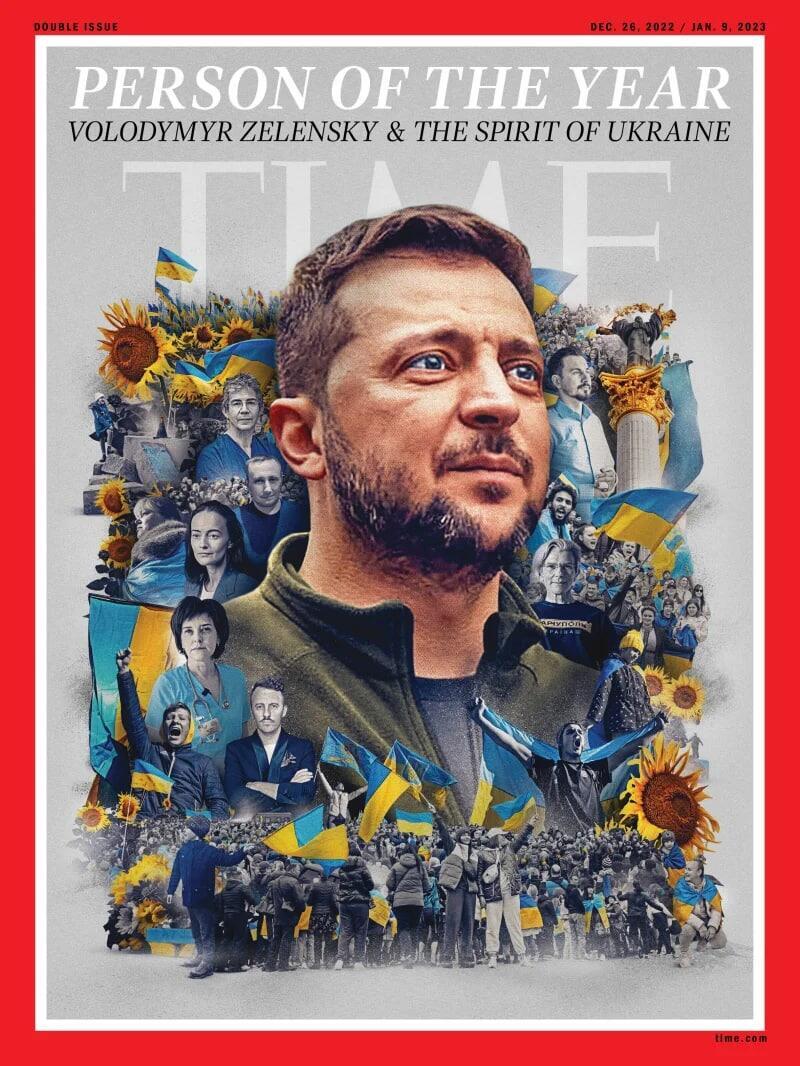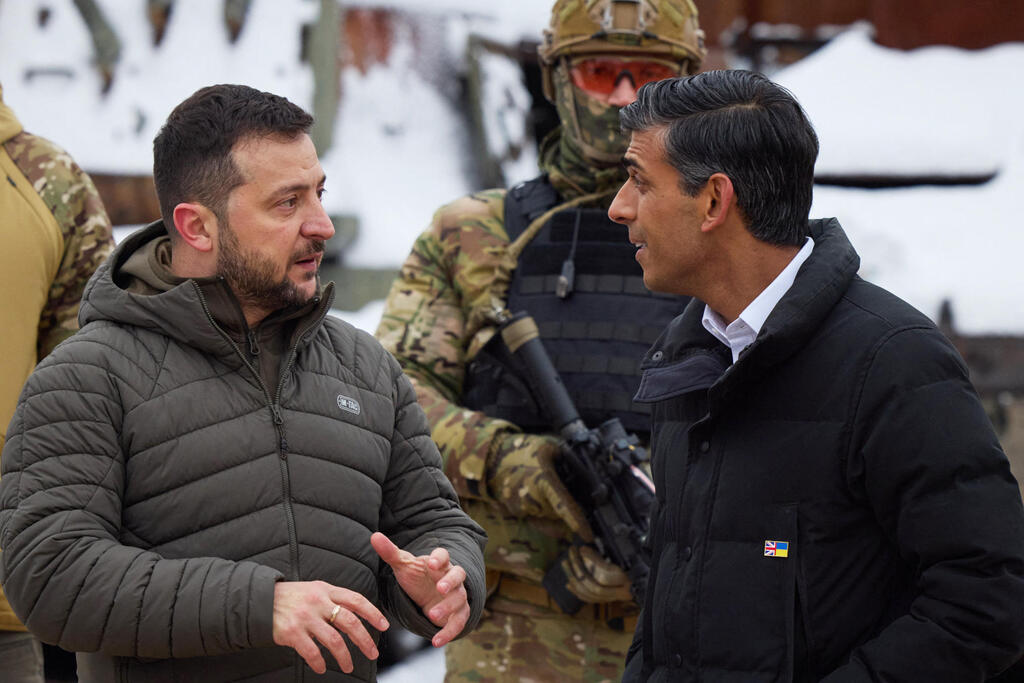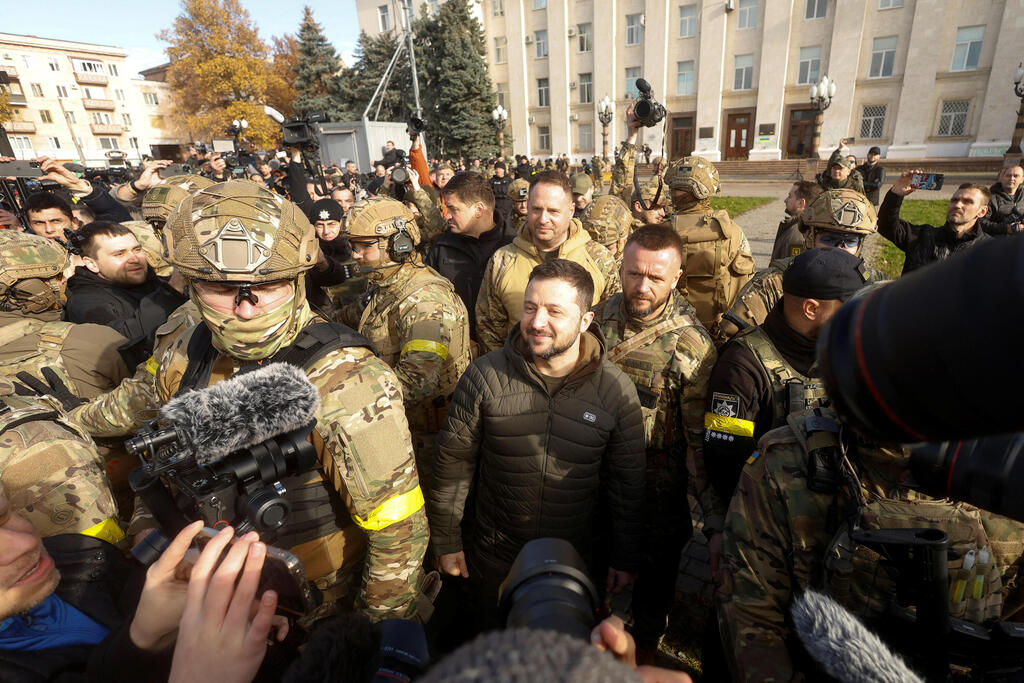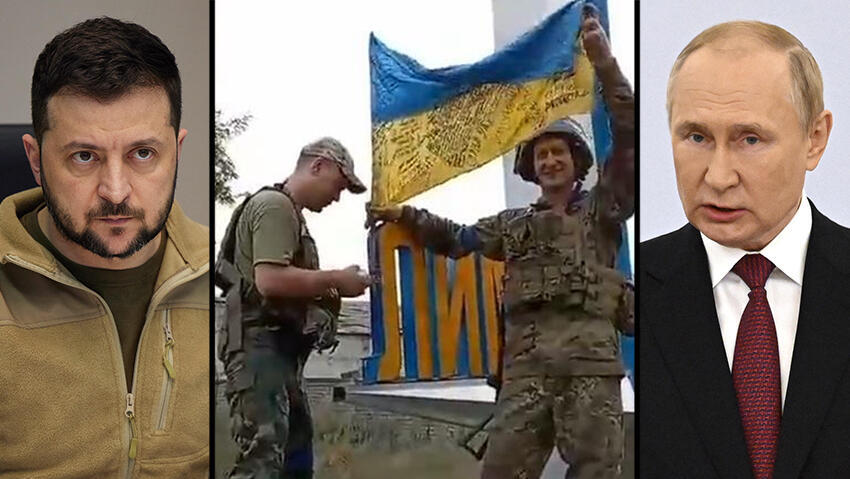Getting your Trinity Audio player ready...
Kherson was the first regional capital the Russians were able to capture since the invasion of Ukraine began, so when it was finally liberated by the Ukrainian armed forces in early November, about nine months after Russia's armed offensive began, it was the definition of a "big deal".
It wasn't just the locals who had to make do with no power and no running water for a long time. That was the least of it. It's the demoralizing feeling of having to live under occupation. Of having to wake up in the morning (after having barely slept since there's no power to heat your home) and see Russian soldiers everywhere, monitoring your every move and listening to your every word.
After living under a Ukrainian government that took care of them for so long, it's a jarring and disorienting feeling.
That's why, despite his advisors and bodyguards pleading with him to avoid the visit, Ukrainian President Volodymyr Zelensky insisted on going. Sure, Russian forces were still spread all across the east bank of the Dnipro River and the area was still spattered with landmines and explosive booby traps, but the boost to morale proved crucial.
The people had to see their president. The Russians did too, for a different reason. It would completely unravel their insistence that nothing is wrong and that they're still controlling the area. With Zelensky there, Putin would not be able to claim otherwise.
Back in the capital Kyiv, things weren't all rays of sunshine. Power was still sporadic after a Russian bombing campaign that still might not be over. Some people are out in the street, using their smartphone camera flash to navigate through the dead of night. Improvisation at its finest.
Ukrainian skies were frequently "visited" by drones, fighter jets and missiles, so the president had to opt for the train as his main means of transportation to various locations around his besieged country. To avoid detection, the train car he would ride in would be modest and unassuming.
Zelensky enjoys train rides since it reminds him of his childhood when he would take the train across Russia and Siberia to visit his father, who would do backbreaking work very far from home to feed his family.
He looks at life differently now. He says the conflict has given him wisdom he had never wanted. His boyish charm has been replaced with a stern look and thoughtful words, carefully chosen. Not nearly as susceptible to distractions as he once was.
All throughout the ride, the scars of war can be seen on the wayside. Metal shrapnel, disfigured structures, decaying human remains. Some businesses seemed to have been subjected to machine gun fire. Broken glass scattered everywhere.
A sense of elation came over people in Kherson. Still had that "recently liberated city" smell. One of Zelensky's aides is a Kherson native, and she was in tears seeing the Ukrainian flag once again hoisted over the city. Calls of "Slava Ukraini!" (Glory to Ukraine!) abounded.
Even the sound of distant explosions did not deter the president from visiting his people. He even refused to wear a helmet or vest. He wanted them to see him without these things. He believed it helps convey the message that the people do not have to live in fear anymore. Kherson will fall no more.
President Zelensky, believe it or not, has a late-model iPhone that he uses to communicate not only with his own citizens but the world at large. Social media channels, online conferences, messages to world leaders. Wherever he can find even the slightest internet connection, he will happily use it. His people need to hear from him.
Even Hollywood celebrities visited Zelensky in his Kyiv compound, many of them carrying gifts and agreeing to serve as Ukraine's celebrity ambassadors for the cause. There's a myriad of ways that the Ukrainian president is able to show everyone that even Russia, mostly feared by the rest of the world, will not take his country down. Ever.
7 View gallery
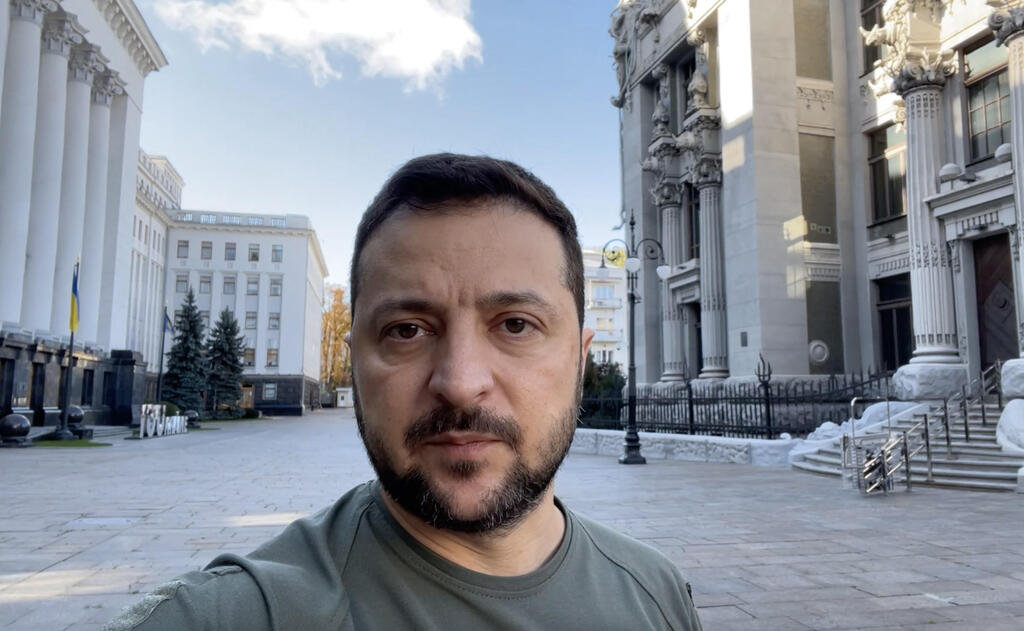

Zelensky uses his iPhone to communicate with his citizens and the world
(Photo: EPA / UKRAINIAN PRESIDENTIAL PRESS SERVICE)
The list of world leaders who fled their own countries in times of war or political turmoil is long. The most recent example is former Afghan president Ashraf Ghani, who fled just before the Taliban took over Kabul last year.
But not Zelensky. He never leaves. He has stated more than once that he will die here if he must. Hard to believe we're talking about a former dancer and comedian who has been president for three years. Barely.
In Kherson, Zelensky handed out medals of honor for bravery. Even one American volunteer got one. He later visited a warehouse converted into a humanitarian aid center, with canned goods stockpiled everywhere. Zelensky walked around, gazing around as volunteers kept on with backbreaking work.
The visit was rounded off with a closed command meeting with his generals in an underground bunker. The meeting went on as the rest of the soldiers went about their duties. The mess hall has mostly canned, unappetizing food, but that's what you eat when you're at war.
Zelensky mostly measures success by how few lives would be lost with every decision he makes. He could have liberated Kherson sooner, but at the expense of many more lives. Living under Russian occupation a bit longer, as unpleasing as it may be, is still preferable to dying in a botched liberation campaign.
Zelensky and his generals have learned to speak in small bursts of information, quick messages. Stripped to the essentials. Distractions and lighter moments would have to wait for another time.
The strictly business approach also sipped into Zelensky's private life. For most of the year, he lived separately from his wife and two kids. Not only for their own safety, but also because he felt that staying with his loved ones at a time when so many others have either seen family killed right in front of them or were forced to be separated from them through no fault of their own would be inappropriate.
Zelensky was not made into who he is without a bit of inspiration. One of his heroes is Lee Kuan Yew, Singapore's founding father. A man who fought corruption in a brutal of fashion and ended up creating one of the most prosperous technological and business hubs on the planet. One of Zelensky's favorite books was about his struggle.
He's also an admirer of wartime comedians, like the legendary Charlie Chaplin. "He used the weapon of information during the Second World War to fight against fascism," Zelensky says. "You see, there were these artists who helped society, because they had a lot of admirers, and their influence was often stronger than artillery.”
7 View gallery
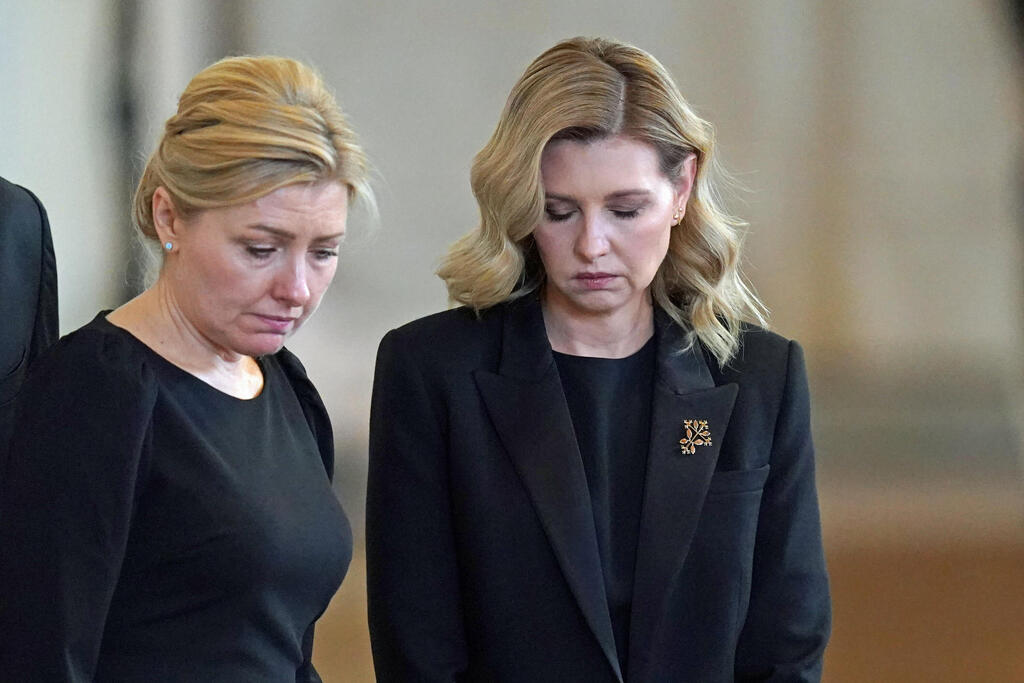

Zelensky has mostly been living apart from his wife and daughter
(Photo: WPA Pool/Getty Images)
Zelensky has a firm memory of Holomodor, which means death by stravation, the mass death of Ukrainians brought about by Soviet leader Joseph Stalin's attempts in the 1930s to reshape Soviet society by confiscating food and redirecting it to different parts of the Soviet Union. A tactic that cost 3,000,000 ethnic Ukrainians their lives.
His parents, both Jews, were Holocaust survivors. His mother's side of the family was evacuated to Uzbekistan by train as the Axis forces began their Ukrainian onslaught. Between the Holomodor and World War II, the Ukrainian people suffered a great deal. Zelensky grew up learning about that struggle.
That's why, despite being fully aware of the clear military advantage that a country like Russia has over Ukraine, Zelensky wants the rest of the world to pull Ukraine in the direction of democracy and freedom. A clear ideological threat to Vladimir Putin.
7 View gallery
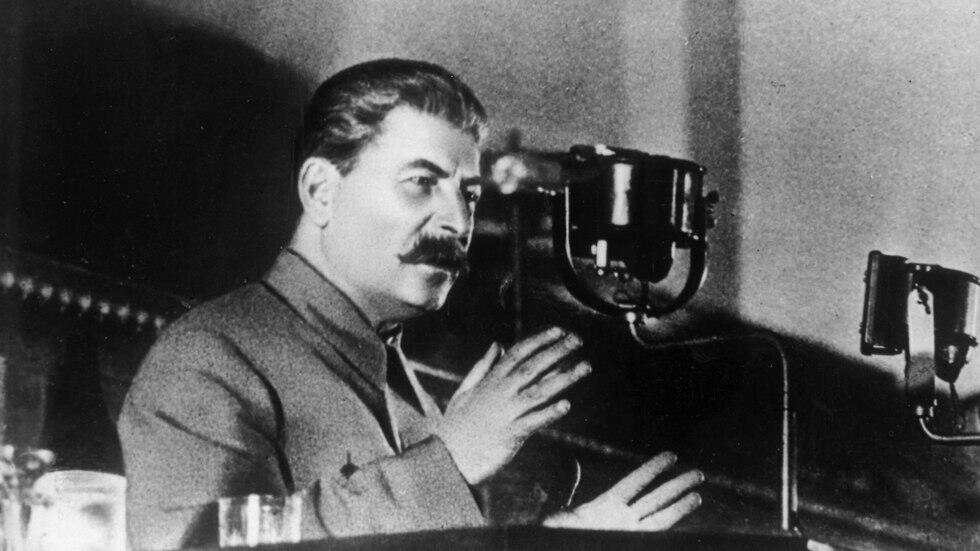

The grief from Stalin's Holomodor policy stays firmly in Zelensky's mind
(Photo: Gettyimages)
Zelensky's aim goes much further than simply winning back territory. It is to prevent future generations of Ukrainians from having to live under a similar threat. “I have not finished this great, important action for our country," he says. "Not yet.”


